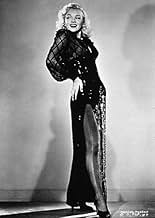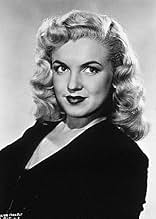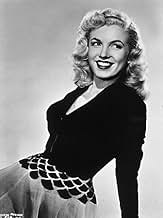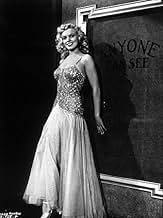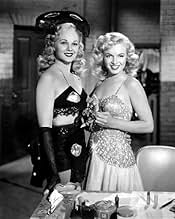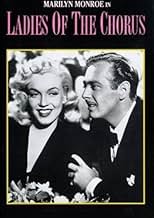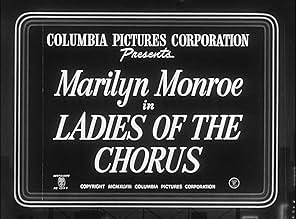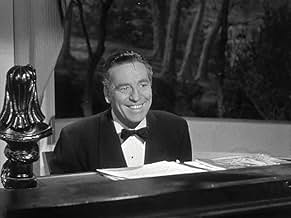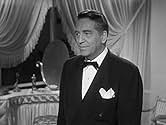IMDb RATING
6.1/10
1.7K
YOUR RATING
A chorus girl falls in love with a wealthy young man, but their relationship is jeopardized by her mother's fears about the reaction of his family.A chorus girl falls in love with a wealthy young man, but their relationship is jeopardized by her mother's fears about the reaction of his family.A chorus girl falls in love with a wealthy young man, but their relationship is jeopardized by her mother's fears about the reaction of his family.
Dave Barry
- Ripple the Decorator
- (uncredited)
Gladys Blake
- Flower Shop Girl
- (uncredited)
Chet Brandenburg
- Audience Member
- (uncredited)
Paul E. Burns
- Mr. Craig - Stage Doorman
- (uncredited)
Robert Clarke
- Peter Winthrop
- (uncredited)
James Conaty
- Party Guest
- (uncredited)
Oliver Cross
- Party Guest
- (uncredited)
Jay Eaton
- Party Guest
- (uncredited)
Bill Edwards
- Alan Wakely - Mae's Ex-husband
- (uncredited)
Ella Ethridge
- Party Guest
- (uncredited)
Adolph Faylauer
- Burlesque Show Spectator
- (uncredited)
Featured reviews
I don't know about you, but I'm a big MM fan. Not a overly huge or fanatical one mind you, but I have seen all her major pictures several times and have seen most of her smaller ones. For a long time Ladies of the Chorus was off of my radar screen. It's not seen often, video stores in my area don't have it. I missed the airings on cable or where ever. For years, I heard that this was a B picture, and one of her first pictures and not a special MM movie. So I figured this was another one of those small chances to see Marilyn similar to her early Fox appearances like "We're not Married" I was wrong, the critics were wrong, and people talking about the movie were wrong. MM is a featured player here in this B picture, it was great fun to see, she does some musical numbers (even if it wasn't her singing I didn't really notice) it was fun to see and I'm glad I made the effort to track down this movie and buy a copy.
A very young Marilyn Monroe in her first lead role made an impression on critics with her performance in this light film about a young burlesque queen whose mother disapproves of her engagement to a wealthy man.
Monroe's sweet singing voice is showcased for the first time in this film, and it is a real treat. She had not yet adopted the "Marilyn Monroe" persona, but even without the breathy baby-doll voice she is the image of innocent seduction.
Although the plot is rather formulaic and simplistic, this film does offer something of a twist at the end. All in all a cute film and opportunity to see Monroe as a young fresh-faced beauty who, as always, lights up the screen.
Monroe's sweet singing voice is showcased for the first time in this film, and it is a real treat. She had not yet adopted the "Marilyn Monroe" persona, but even without the breathy baby-doll voice she is the image of innocent seduction.
Although the plot is rather formulaic and simplistic, this film does offer something of a twist at the end. All in all a cute film and opportunity to see Monroe as a young fresh-faced beauty who, as always, lights up the screen.
Back in her earlier days in Hollywood, Marilyn Monroe did what most aspiring actresses did...she played bit parts and supporting roles. While "Ladies of the Chorus" offers her a bit more, she's not the lead nor was she ever intended to be. After all, it was 1948 and she was still a couple years from stardom. However, the studio did what I've seen many times with Monroe....after she become famous, they re-cut the movie (adding a title screen that shows Monroe in the lead) and re-released it! I watched this version. I've also seen many DVDs of Monroe and her bit roles with covers blazoned with her face....as if she was the star...so this re-issuing isn't any surprise to me.
The actual star of this film is Adele Jurgens, a gorgeous blonde who did quite a bit of television in the 50s. Sadly, her career worked out but not nearly enough to offer her many more starring roles. On the positive side, she lived a very long and full life aside from acting.
As far as Jurgens, despite being the star, the casting of Monroe as her daughter (despite only being nine years older) must have been painful to her. Jurgens plays Mae Martin, a chorus girl who works with her daughter, Peggy (Monroe). But when Peggy falls in love and the man asks her to marry her, Mae is worried. After all, Mae's husband came from a good family, just like this man, and she is worried that love won't be enough to keep Peggy's marriage going strong. After all, 'good families' don't want ex-chorus girls marrying into their family...and Mae's husband just couldn't cut it. What will come of Peggy and her new man?
In addition to this plot, there is lots of singing and dancing...especially by Jurgens and Monroe. Considering the film is made by Lippert Studios, it's surprisingly good...as I usually expect very little from their productions. The best part is how all this worked out in the film....something that makes it all worth seeing.
The actual star of this film is Adele Jurgens, a gorgeous blonde who did quite a bit of television in the 50s. Sadly, her career worked out but not nearly enough to offer her many more starring roles. On the positive side, she lived a very long and full life aside from acting.
As far as Jurgens, despite being the star, the casting of Monroe as her daughter (despite only being nine years older) must have been painful to her. Jurgens plays Mae Martin, a chorus girl who works with her daughter, Peggy (Monroe). But when Peggy falls in love and the man asks her to marry her, Mae is worried. After all, Mae's husband came from a good family, just like this man, and she is worried that love won't be enough to keep Peggy's marriage going strong. After all, 'good families' don't want ex-chorus girls marrying into their family...and Mae's husband just couldn't cut it. What will come of Peggy and her new man?
In addition to this plot, there is lots of singing and dancing...especially by Jurgens and Monroe. Considering the film is made by Lippert Studios, it's surprisingly good...as I usually expect very little from their productions. The best part is how all this worked out in the film....something that makes it all worth seeing.
LADIES OF THE CHORUS is a fairly rare "B" movie from 1948 of interest because it's Marilyn Monroe's very first starring film but beyond that it's a quite well-made little musical. Marilyn was a complete unknown at the time with only a little extra work and one credited bit part under her belt when she was cast in this movie and yet she's quite wonderful and a total pro.
Marilyn stars as Peggy, a very young burlesque chorus girl who works in the chorus alongside her fortyish mother Mae (Adele Jergens). When the obnoxious "star" of the show walks out, Peggy steps into her part and becomes a sensation, earning the interest of various back door johnnies, in particular wealthy heir Randy (Rand Brooks). Peggy and Randy fall in love and he proposes but Mae is wary that Peggy will never be accepted in his social circles from her own past experience with her own annulled marriage to a socially prominent young man decades ago. Mae makes Randy promise to tell his mother (Nana Bryant) that Peggy is a burlesque queen in advance of their visit to the family's Cleveland estate, which he fails to do.
Marilyn is just adorable in this film and sings two surprisingly good songs for a "B" movie, "Anyone Can See I Love You" and "Every Baby Needs a Da Da Daddy", the latter a sexy little number that foreshadows her classic "Diamonds are a Girl's Best Friend" in sexiness and philosophy, right down to a reference to Tiffanys. Columbia's resident B queen of the era Adele Jergens is negated to a subordinate role as her mother, as still shapely middle-aged dancer who hides her gray hair under a blonde wig. Adele does very well at suggesting a slightly tired woman a decade or so older than her actual age and also gives a very good performance. (Adele was top billed in the original 1948 release but it appears only copies from the 1952 reissue exist where Marilyn was given that spot).
Rand Brooks (best known as Scarlett O'Hara's first husband in GONE WITH THE WIND) is quite pleasant as Marilyn's romantic suitor (they have a lovely scene together parked in a car that is an endearing ode to wholesome young love) and character actress Nana Bryant gives a pleasant performance as his mother, complete with a musical number of her own, the memorable "You're Never Too Old". Standing out in good comic unbilled bits are Gladys Blake as a gossipy sales girl and Dave Barry as a garbled-speaking decorator.
Running just a minute over an hour, the movie moves so quickly there's really no time for dull spots. This movie was reissued in 1952 by Columbia at the dawn of Marilyn's stardom but was virtually unseen for decades thereafter (likely because it was too short for most television movie programming slots); it reemerged in 1994 on video and a few years later had a handful of showings on cable television. Today your best bet in seeing it would probably be in buying a used copy of the out-of-print VHS tape or, if your DVD player can handle it, the region 2 DVD release from the United Kingdom in a Marilyn Monroe boxed set.
Marilyn stars as Peggy, a very young burlesque chorus girl who works in the chorus alongside her fortyish mother Mae (Adele Jergens). When the obnoxious "star" of the show walks out, Peggy steps into her part and becomes a sensation, earning the interest of various back door johnnies, in particular wealthy heir Randy (Rand Brooks). Peggy and Randy fall in love and he proposes but Mae is wary that Peggy will never be accepted in his social circles from her own past experience with her own annulled marriage to a socially prominent young man decades ago. Mae makes Randy promise to tell his mother (Nana Bryant) that Peggy is a burlesque queen in advance of their visit to the family's Cleveland estate, which he fails to do.
Marilyn is just adorable in this film and sings two surprisingly good songs for a "B" movie, "Anyone Can See I Love You" and "Every Baby Needs a Da Da Daddy", the latter a sexy little number that foreshadows her classic "Diamonds are a Girl's Best Friend" in sexiness and philosophy, right down to a reference to Tiffanys. Columbia's resident B queen of the era Adele Jergens is negated to a subordinate role as her mother, as still shapely middle-aged dancer who hides her gray hair under a blonde wig. Adele does very well at suggesting a slightly tired woman a decade or so older than her actual age and also gives a very good performance. (Adele was top billed in the original 1948 release but it appears only copies from the 1952 reissue exist where Marilyn was given that spot).
Rand Brooks (best known as Scarlett O'Hara's first husband in GONE WITH THE WIND) is quite pleasant as Marilyn's romantic suitor (they have a lovely scene together parked in a car that is an endearing ode to wholesome young love) and character actress Nana Bryant gives a pleasant performance as his mother, complete with a musical number of her own, the memorable "You're Never Too Old". Standing out in good comic unbilled bits are Gladys Blake as a gossipy sales girl and Dave Barry as a garbled-speaking decorator.
Running just a minute over an hour, the movie moves so quickly there's really no time for dull spots. This movie was reissued in 1952 by Columbia at the dawn of Marilyn's stardom but was virtually unseen for decades thereafter (likely because it was too short for most television movie programming slots); it reemerged in 1994 on video and a few years later had a handful of showings on cable television. Today your best bet in seeing it would probably be in buying a used copy of the out-of-print VHS tape or, if your DVD player can handle it, the region 2 DVD release from the United Kingdom in a Marilyn Monroe boxed set.
The plot explores the idea of being accepted as a chorus girl. Will the upper class set acknowledge such a lowlife species? The story is trivial but holds an interest as Marilyn Monroe (Peggy) carries herself well in one of her early entries. Thankfully, we see her deliver her lines without that irritating baby-talk that became her trademark. She talks properly in this film! So, it's a treasure if only for that.
There is a good segment where Adele Jurgens (Mae) shows off some dance moves – probably the best moment of the film. The music is OK, Marilyn Monroe sings a couple of songs, but nothing too special.
The flimsy story wraps itself up over the course of an hour, but we watch it for Marilyn Monroe.
There is a good segment where Adele Jurgens (Mae) shows off some dance moves – probably the best moment of the film. The music is OK, Marilyn Monroe sings a couple of songs, but nothing too special.
The flimsy story wraps itself up over the course of an hour, but we watch it for Marilyn Monroe.
Did you know
- TriviaWhen the film was re-released in November 1952, Columbia redesigned the opening title credits with the name of Marilyn Monroe over the title, and the name of Adele Jergens, who originally had top billing, moved to the head of the supporting cast; this is the version that was shown on Turner Classic Movies.
- GoofsIn a flashback that takes place more than twenty years earlier, the women's hairstyles and clothes are those of 1948.
- Quotes
Chorus Girl #3: He says to me, "I'd like to see your show, baby, how about a couple of passes?"
Chorus Girl #2: The nerve!
Chorus Girl #1: And the guys I go out with don't want passes. They just make 'em.
Chorus Girl #3: Speaking of passes, I've been knocking down so many lately, I feel like an All-American.
- ConnectionsEdited into Okinawa (1952)
- How long is Ladies of the Chorus?Powered by Alexa
Details
- Release date
- Country of origin
- Language
- Also known as
- Ladies of the Chorus
- Filming locations
- Production company
- See more company credits at IMDbPro
- Runtime1 hour 1 minute
- Color
- Aspect ratio
- 1.37 : 1
Contribute to this page
Suggest an edit or add missing content

Top Gap
By what name was Les reines du music-hall (1948) officially released in India in English?
Answer
